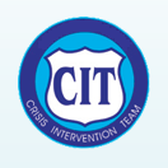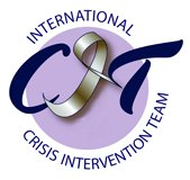Crisis Intervention Teams (CIT)
|
|
CIT (Crisis Intervention Team) programs are local initiatives designed to improve the way law enforcement and the community respond to people experiencing mental health crises. They are built on strong partnerships between law enforcement, mental health provider agencies and individuals and families affected by mental illness.
-NAMI (National Alliance on Mental Illness) |
Get your CIT Challenge Coin click here

We are advocates in Crisis Intervention Team (CIT) models and find their effectiveness goes beyond helping those who are in a behavioral health crisis. An effective program contains three core elements: Inclusive Collaboration, Training, and Coordinated Responses. These elements have been published and shown to be an effective evidence based approach. CIT is a movement in public safety and behavioral health that can be started and nourished by anyone. No one side of the issue (Law Enforcement, Public Safety, Behavioral Health Providers, Advocates, Etc.) can make positive change without the other. More on the core elements below.
|
Inclusive collaboration
CIT programs partner with universities, corrections departments, homeless assistance providers, hospitals, advocates, peers, and family members. Collaboration helps law enforcement agencies create access to a system of care. A program coordinator is involved in all aspects of the CIT program, promoting collaboration, recognition, transparency, and cross-agency development. In any community, a good starting point is to have a designated program coordinator who builds partnerships through outreach, promotes the CIT program, collects and shares data, and is involved in all aspects of the program.
|
Training
CIT programs provide foundational and advanced knowledge of mental health, de-escalation, and resources. CIT training should touch on at least one of three topics: safety, destigmatization, and accessing resources. A robust program may have a 40-hour basic course with an additional advance course. In any community, even in courses with fewer hours, training on severe mental illness must serve the function of promoting safety, decreasing stigma, or finding resources—otherwise why teach law enforcement personnel about mental illness at all?
|
Coordinated Responses
Coordinated responses are the active component of a CIT program that is supposed to make life better and safer for the citizens. In Albuquerque, real-time responses have clinical guidance and try to focus only on situations where police are truly needed. This includes the CIT detectives, field officers, clinicians, the psychiatrist, and other civilians.
In any community, coordinated responses can start with just one or two officers who have an interest in working with people living with mental illness, and with the support of a law enforcement agency, officers can be assigned as mental health detectives or program coordinators. |
"increased collaboration between psychiatrists and law enforcement will help prevent situations in which police officers are placed in the awful position of having to use lethal force against a person with mental illness."
-Nils Rosenbaum, MD
There are great resources out there for starting a CIT program. Below are some links to national (USA) resources and information for setting up your own program. We have helped established CIT programs throughout the country and are always available to help, contact us for consultation and information. You can also begin your research looking through publications here.
American Journal of Psychiatry
Journal article on police and mental health collaborations outlining elements needed to create an advanced Crisis Intervention Team program. This page includes the article, video review, and news articles about the findings.
University of Memphis - CIT Center
The University of Memphis has created this awesome online CIT Center. You can see what national best practice curriculum looks like and what is needed to start up a program. This is a Bureau of Justice Assistance funded project. This should be a starting point or a checking point on your CIT program. This has guidelines for national best practices and standards.
NAMI
NAMI, the National Alliance on Mental Illness, is the nation’s largest grassroots mental health organization dedicated to building better lives for the millions of Americans affected by mental illness. NAMI has been involved in the beginning from the first CIT team to many that has been created through the country. Check out their website for more information and to get a hold of your local affiliate. They also offer a variety of classes for the public, law enforcement, and families on mental health.
CIT International
CIT International is a non-profit membership organization whose primary purpose is to facilitate understanding, development and implementation of Crisis Intervention Team CIT programs throughout the United States and in other nations worldwide in order to promote and support collaborative efforts to create and sustain more effective interactions among law enforcement, mental health care providers, individuals with mental illness, their families and communities and also to reduce the stigma of mental illness.






